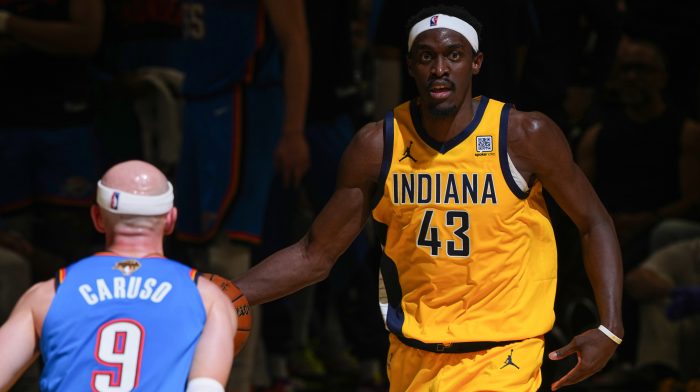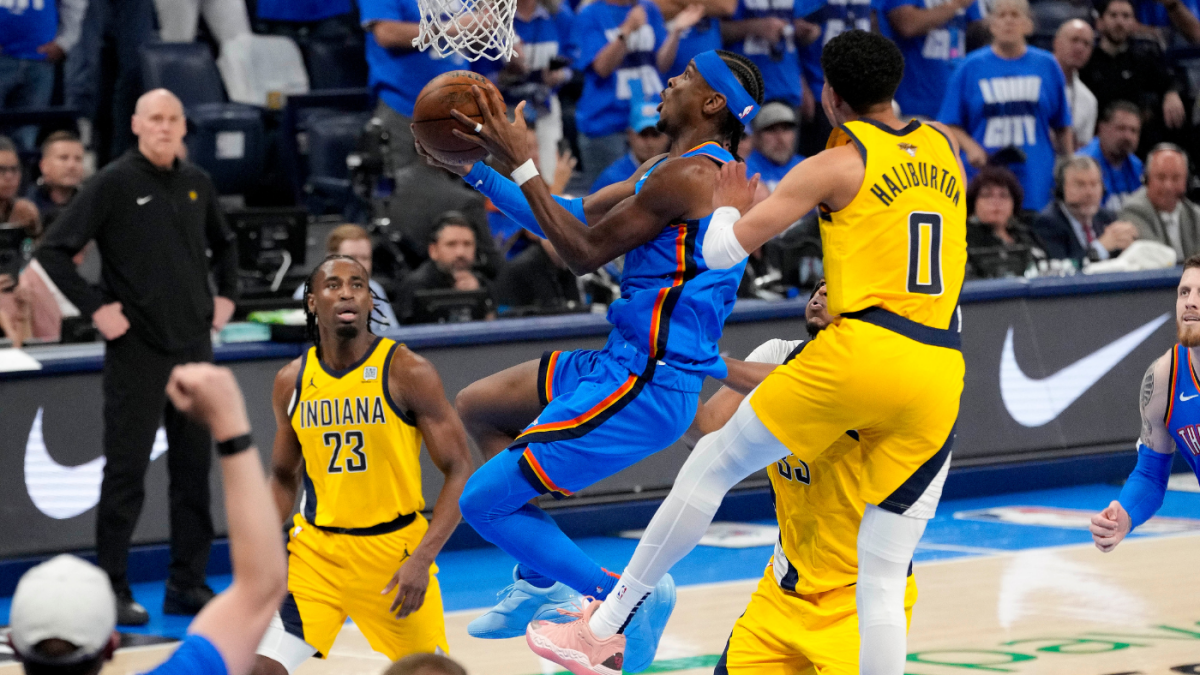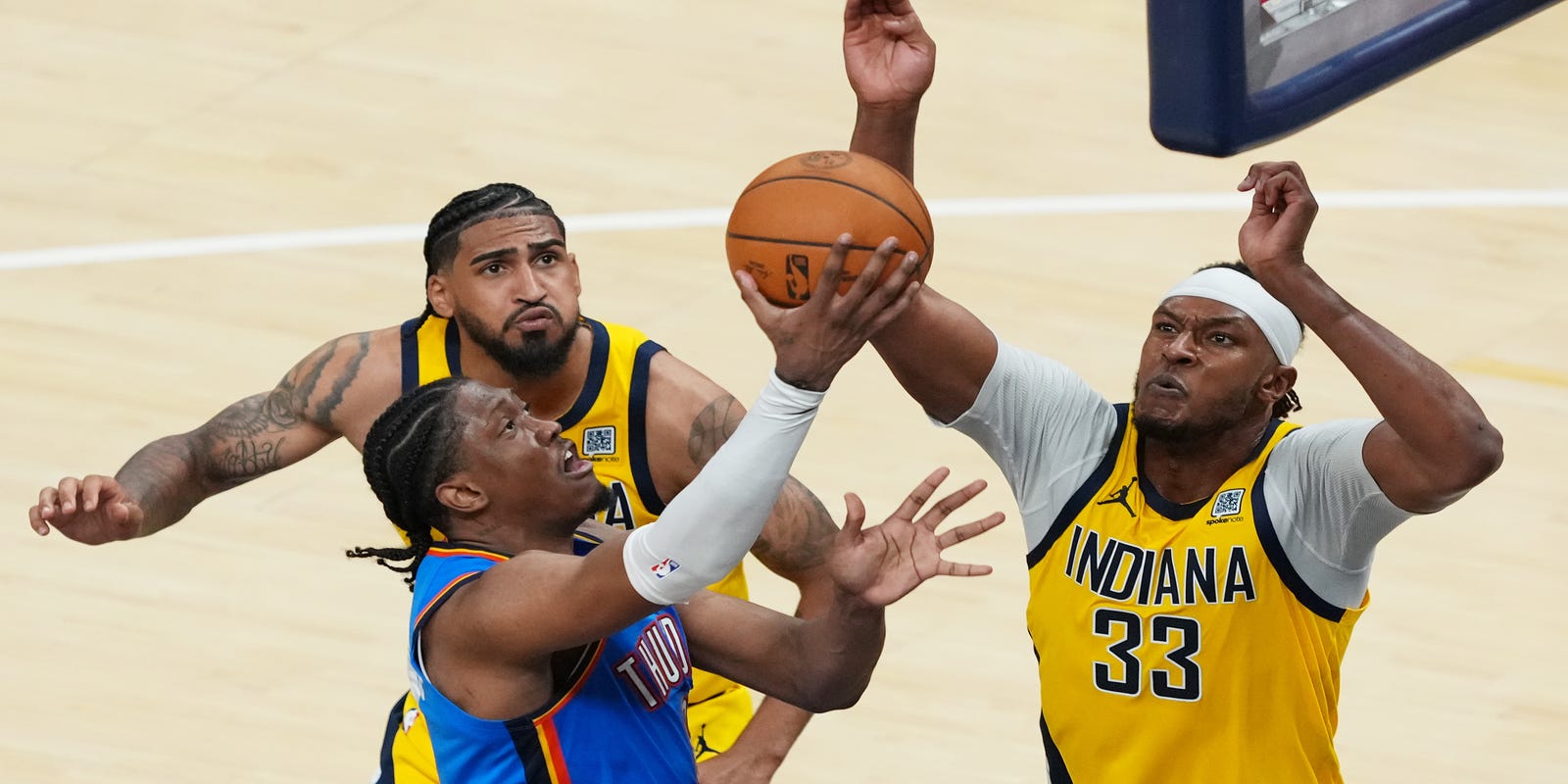INDIANAPOLIS – Pascal Siakam brought the Larry O’Brien Championship Trophy to the Giants of Africa basketball camp in Yaoundé, Cameroon, after winning an NBA championship with the Toronto Raptors in 2019.
The Cameroon native’s hope was to inspire the next generation of African basketball players. One camper who was inspired was a then-15-year-old named Yves Missi, who dreamed that day of being in the NBA after seeing it was possible.
Six years later, Siakam is still inspiring aspiring basketball players from Cameroon and Africa as he returns to the 2025 NBA Finals as a member of the Indiana Pacers. The three-time NBA All-Star’s grassroots efforts are paying dividends as his old camper Missi starred as a rookie with the New Orleans Pelicans last season.
“Just him bringing the trophy and then showing it to us and obviously having the opportunity to touch the trophy for the first time as a kid, that feeling was a different feeling that I’ve never felt before knowing that he’s the first from here to ever do it,” Missi told Andscape. “I didn’t really meet him. I just said, ‘Hi,’ and took a picture. He came, so that was key.
“And then taking the picture and seeing the trophy was the main thing for me. I felt it helped people understand that if someone from where you come from makes it to a certain level, there is a possibility for us to even play on that type of stage or even dream about winning a championship one day.”
The African basketball world suffered a major loss in 2024 with the passing of Naismith Hall of Famer Dikembe Mutombo. The four-time NBA Defensive Player of the Year was not only one of the greatest African basketball players but also an ambassador, philanthropist and mentor.
Fellow Hall of Famer Hakeem Olajuwon, 62, is a 12-time NBA All-Star who is widely regarded as the greatest African player ever, but he keeps a low profile.
The most decorated current NBA player born in Africa is Philadelphia 76ers center Joel Embiid, the 2023 NBA Most Valuable Player and an Olympic gold medalist.
Africa, however, has its eyes on Siakam during the 2025 NBA Finals. Siakam has an opportunity to be the first African to win two NBA titles since Olajuwon (1994 and 1995). Siakam also garnered notice by winning the 2025 Eastern Conference finals Most Valuable Player award. He and his Pacers own a 2-1 lead in the best-of-seven NBA Finals with Game 4 tonight (ABC, 8:30 p.m. ET) here against the Oklahoma City Thunder.
“I’m just a young kid from Cameroon that moved to the U.S. when I was 18 years old and gave everything to the game of basketball,” Siakam said.

NBA Photos/NBAE via Getty Images
Far from here in Pretoria, South Africa, African basketball players taking part in the Basketball Africa League playoffs that began on June 6 were inspired by Siakam. The BAL championship will take place on Saturday.
“Pascal’s return to the NBA Finals is incredibly inspiring for all of us,” BAL president Amadou Fall told Andscape. “When we tipped off our BAL playoffs, the whole basketball community across Africa was also following Pascal’s journey with pride and admiration. Winning the NBA title in 2019 and being named the NBA’s Most Improved Player was super special.
“Now getting back to the NBA Finals with a different team as the MVP of the Eastern Conference finals confirms his elite status. Pascal is a special young man, deeply committed to his roots as a shining role model for a youthful continent and an example for our BAL players and all young aspiring talent in the African basketball ecosystem.”
Siakam’s journey from Cameroon to the NBA has the makings of a Hollywood movie. The NBA’s hope is to continue developing basketball talent in Africa through the BAL, the NBA Academy Africa and Basketball Without Borders, offering a smoother road than Siakam was afforded.
Siakam was actually supposed to be a Catholic priest, not an NBA star. Tchamo Siakam enrolled his son in St. Andrew’s Seminary school in the village of Bafia, Cameroon. However, Pascal misbehaved to get expelled since he didn’t share his father’s dreams.
While Siakam had three older brothers who played Division I college basketball, he hooped just for fun from time to time on a damaged rim during his youth. His feelings toward the game changed when he played in then-NBA player Luc Mbah a Moute’s basketball camp in Cameroon in 2011 and 2012.
That led to an invitation to a Basketball Without Borders Camp in Johannesburg in 2012. He only accepted it to visit his sister, who lived there. Siakam had not seen her in years, he said.
“If he didn’t make that decision to go to Basketball Without Borders, he would have never been in this position,” NBA deputy commissioner Mark Tatum, who is leading the NBA’s development in Africa, told Andscape. “And now he is giving back to his community, giving back to the continent.”
Siakam received coaching at Basketball Without Borders from the likes of Mutombo and then-NBA players Luol Deng, Serge Ibaka and Thabo Sefolosha. Camp counselors, including then-first-year Raptors general manager Masai Ujiri, took notice of Siakam’s athleticism, motor, length and fight.
That performance opened the door for Siakam to move to the United States at 16. He eventually landed a scholarship to play for God’s Academy in Lewisville, Texas. In 2014, he was awarded a full college basketball scholarship from New Mexico State. Siakam was drafted by Ujiri and the Raptors with the 16th overall pick in the 2016 NBA draft.
After succeeding on a less-traveled road to the NBA, Siakam believes there are lessons to be learned from his journey.
“I really don’t look at myself, like, I’m a role model or anything,” Siakam said. “I just feel like you can look at my journey and be like, ‘Man, he did it. He did it the hard way. There were no shortcuts. Someone that gave everything, just worked hard, put his head down. No matter the obstacles, he just kept working.’
“That’s something I want to tell young players. It’s not going to be easy. Nobody’s going to give you anything. You’re probably going to have less opportunity because you come from where you come from.”

Jesse D. Garrabrant/NBAE via Getty Images
After spending time in the G League, the 6-foot-8 forward blossomed into a starter and a champion with the Raptors during the 2018-19 season, and he was a first-time NBA All-Star in 2020. The 2022 All-NBA third-team selection made his third career All-Star appearance this season.
Now, Siakam and fellow Pacers star Tyrese Haliburton are trying to lead the Pacers to their first NBA championship. The franchise joined the league from the American Basketball Association in 1976.
“What’s motivating about his story is that it is the living proof that when talent, high character and hard work meet opportunity, the sky is the limit irrespective of background and origin,” Fall said. “It’s an affirmation of limitless possibilities for aspiring basketball players all over Africa. More motivation for us to keep strengthening the pathways from grassroots to elite that is now established.”
Said Missi: “A lot of people are proud. A lot of people were texting me about him the other day. … He’s actually the only one from Cameroon who proceeded to win a championship. So, it is great seeing him succeed. And he is not only Cameroon, he is from Africa in general.”
The instrumental Basketball Without Borders program, which includes Embiid and Siakam as alumni, has existed in Africa since 2003 with more than 4,500 participants. Giants of Africa, Ujri’s basketball initiative in Africa to empower African youth on and off the court, was founded in 2000. Fall’s Sports for Education and Economic Development (SEED) project began in 2002 in Senegal. It was Africa’s first basketball student-athlete academy and produced former NBA center Gorgui Dieng.
In recent years, the NBA Academy Africa in Saly, Senegal, has been the most instrumental in producing elite basketball talent from the continent. The NBA Academy Africa could be moved in the coming years, possibly to South Africa, and revamped, a source said.
Its alumni include Duke center Khaman Maluach (a projected top-10 NBA draft pick), Raptors center Ulrich Chomche, former Portland Trail Blazers center Ibou Badji, G League forward Babacar Sane and University of Florida center and NCAA champion Rueben Chinyelu. Maluach, Chomche, Sane and Chinyelu also played in the BAL.
The BAL is also promoting basketball across the continent with an NBA style of play and games in Morocco, Rwanda, Senegal and South Africa this season. There are also newer organizations like Play 2 Lead, an organization hoping to inspire the next generation of African basketball players through sports, education and leadership development.
National teams in Africa are also getting stronger as evidence of South Sudan defeating Puerto Rico during the 2024 Paris Olympics for its first-ever win.
“Today, what we are doing on the continent is creating a clearer pathway for players like Pascal,” Tatum said. “And you see that with Ulrich Chomche, who came to our academy, played in the BAL and gets drafted in the second round last year and played in the G League. You see it in Ruben Chinyelu winning a national championship at Florida and playing in BAL and in our academy. Khaman Maluach played in our academy and three seasons in the BAL.
“The path is becoming clearer now for these African players much more than when Pascal was there. That is a direct result of the investments we are making on the continent.”
So why is the NBA so committed and attracted to growth of basketball in Africa?
NBA commissioner Adam Silver said the league expects “enormous growth” with basketball in Africa over the next 10 years. Silver noted that Africa has roughly 55 countries, is larger than China, has a fast-growing population and six of the world’s top 10 growing economies.
“There is so much talent.” Silver said. “One of the things we have to decide as a league working with FIBA, our federation, is how much we should be investing in helping develop that talent, especially at an elite level. We have academies in Africa. Also, to put it in terms of the magnitude, I recently read this statistic: that in five years from now — not 25 years from now, but five years from now — it’s projected that over 40 percent of the youth of the world will live in Africa.
“So, to the extent that we are a growing sport — and we’re not the No. 1 sport in Africa, it’s likely soccer — but we’re pretty much the No. 2, maybe rugby in some markets, certainly the fastest-growing sport as we look out to the future, not just in terms of where our players are going to come from, but also Africa as a market.”
Siakam has been impressed with the growth of the game and the opportunities in Africa. Missi said he watched Siakam in the 2019 NBA Finals at 2 a.m., though he was rooting for the Golden State Warriors.
Countless African kids are staying up watching Siakam again in these Finals.
“For me, coming in as a young player, not really having played any basketball, having to learn on the fly, at that time it was mostly like when you were a big guy from Cameroon, you came in, you was a big, you ran, you dunked,” Siakam said. “That’s pretty much what it was. For me, I can see that evolving now with guys my size being able to do different things.
“Now with the NBA going in Africa, there’s just so much more development and guys are getting a lot better. The skills are being learned early on, something that I had to do really late in my career.
“So, it’s evolving. I hope I can be one of those guys that some young guys can look at [and] understand, ‘Look at his journey and the things he’s able to accomplish and how he did it.’ They can take it as an example.”


